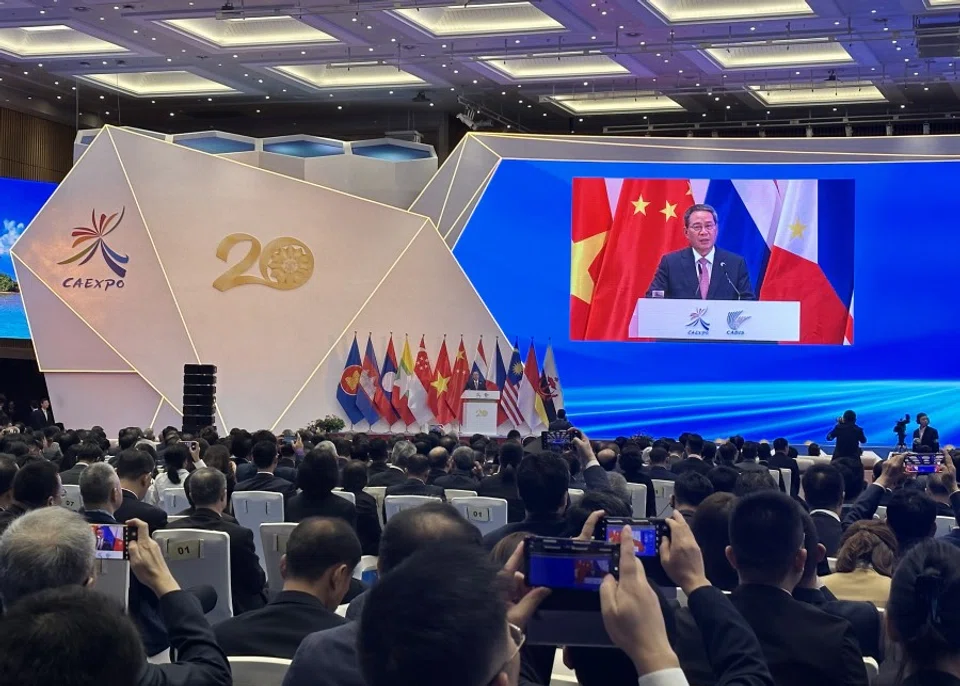China's 'community of shared future' with Southeast Asia: Behind the numbers
Seven ASEAN member states have signed on to China's "community of shared future" more for mutually beneficial cooperation than because they subscribe fully to the Chinese vision of a new regional order. The remaining three may prefer practical cooperation rather than to be enmeshed in China's grand strategy and discourse.

Beijing regards Southeast Asia as an important part of its vision of "a global community of shared future". This vision received a boost when Vietnam became the seventh ASEAN member state (AMS) to support it in December 2023. However, a look behind the signatory numbers reveals a mixed picture.
China mooted a "global community of common destiny" in 2013 and has substantiated this vision over the years. In 2015, the term "common destiny", which is deterministic, was replaced by the more neutral "shared future". China progressively introduced the Belt and Road Initiative (BRI), Global Development Initiative (GDI), Global Security Initiative (GSI) and Global Civilisation Initiative (GCI) as building blocks of this vision. In 2023, the tenth anniversary year, Beijing launched the GCI in March and released white papers on a global community of shared future and the BRI, two reports on the GDI, and a concept paper on the GSI.
Southeast Asian countries receptive to GDI
Seven AMS, namely, Cambodia, Indonesia, Laos, Malaysia, Myanmar, Thailand and Vietnam have agreed to build a community of shared future with China. These countries are largely motivated by the benefits of mutual cooperation with China than fully subscribe to Beijing's vision of a multilateral order with China at the helm, as opposed to a US-led world order and alliance system.
For Vietnam, the latest signatory, some observers opined that Hanoi needed to balance its relationship with key external partners but this was not a substantive change in its foreign policy orientation. Minus the Philippines, which is having a tense standoff with China on the South China Sea dispute, Beijing can be expected to press Brunei and Singapore to join its vision.
Southeast Asian countries' receptiveness to the GDI [Global Development Initiative] reflects their preoccupation with socioeconomic development and willingness to work with suitable partners like China.

Whether China succeeds in making Southeast Asia an integral part of its global community of shared future would depend on the region's receptiveness to the initiatives that substantiate this vision. Among them, the GDI has gained the most traction, with all ten AMS in the Group of Friends of the GDI. ASEAN is keen to explore development cooperation with the GDI to complement its own community-building process. ASEAN and its member states account for 14 out of 50 projects (or 28%) under the GDI Project Pool released in September 2022.
Southeast Asian countries' receptiveness to the GDI reflects their preoccupation with socioeconomic development and willingness to work with suitable partners like China. Furthermore, the GDI involves less or non-sensitive areas that can offer tangible benefits such as poverty reduction, industrialisation, pandemic response and vaccines, food security, climate change and green development, and digital connectivity.
Southeast Asian countries are also likely to be receptive to the GCI, given its rhetorical call for mutual respect and learning from different civilisations, and more people-to-people exchanges. However, they will become wary if the GCI becomes a conduit to further China's overseas influence operations or weakens the role of the US in "civilisational" terms.
Hesitation on security cooperation
Southeast Asia seems least receptive to the GSI for several reasons. First, the region is generally sceptical of security frameworks that can potentially constrain manoeuvring space, which pertains to both China-led and U.S.-led frameworks. Second, it is not entirely clear if the GSI is as inclusive as it claims.
The GSI concept paper mentions the 2014 Conference on Interaction and Confidence Building Measures in Asia where Xi Jinping enunciated the concept of common, comprehensive, cooperative and sustainable security. While this sounds innocuous, Xi also made an exclusive call for the "people of Asia to run the affairs of Asia, solve the problems of Asia and uphold the security of Asia".
Beijing's vision to build a community of shared future with Southeast Asia envisions a scenario where China is in a dominant position to command deference from regional countries to its "national core interests" and curtail their engagement with "extra-regional" powers.

During his Hanoi visit in December 2023, Xi made a similar refrain, saying that "Asia's future is in the hands of no one but Asians". Third, the South China Sea disputes and Russia's war in Ukraine demonstrate that China pursuing common and cooperative security with AMS is easier said than done, given their varying stances in both issue areas. Often, issues related to sovereignty and territorial integrity are non-negotiable for disputing countries.
Vestiges of history
Beijing's vision to build a community of shared future with Southeast Asia envisions a scenario where China is in a dominant position to command deference from regional countries to its "national core interests" and curtail their engagement with "extra-regional" powers. This would not sit well with Southeast Asian nation-states that prize their sovereignty and prefer to maintain a healthy equilibrium in their relations with the major powers.
The white paper on a global community of shared future extols the Chinese Communist Party (CCP) as having pursued "progress for all of humanity and the common good of the world" since it was established a century ago. For Southeast Asia, however, this claim of the CCP's progressive and peaceful role is disingenuous and jarring as it harks back to the 1950s, 1960s, and 1970s when the CCP supported communist elements in Southeast Asia that sought to overthrow then fledging governments. The CCP's past actions underscore the need for Southeast Asian countries to remain vigilant against external actors exploiting their domestic situations for geopolitical purposes.
Numbers-wise, Beijing's effort to build a community of shared future with Southeast Asia seems to be making good progress but those that have endorsed it are not necessarily in full alignment with the Chinese vision and its associated initiatives. Those yet to do so might not be reluctant to cultivate closer ties with China. Their ultimate objective is to pragmatically engage in mutually beneficial cooperation with China short of bandwagoning with Beijing's grand scheme for a new regional order.
This article was first published in Fulcrum, ISEAS - Yusof Ishak Institute's blogsite.



![[Photos] Fact versus fiction: The portrayal of WWII anti-Japanese martyrs in Taiwan](https://cassette.sphdigital.com.sg/image/thinkchina/3494f8bd481870f7c65b881fd21a3fd733f573f23232376e39c532a2c7593cbc)

